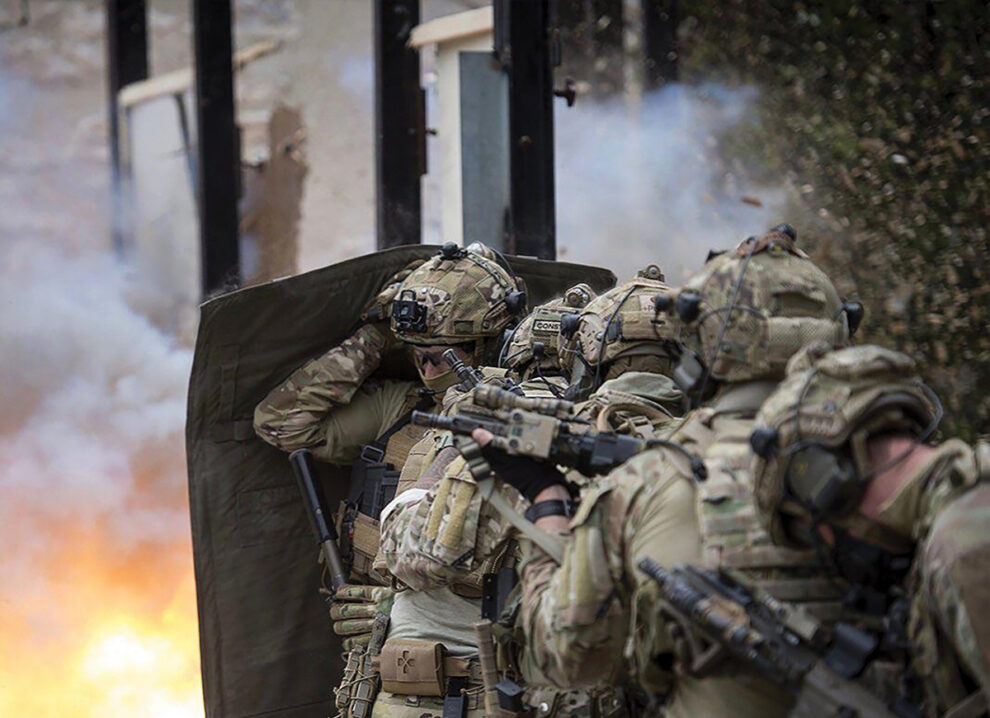It’s a boiling summer morning on the Athens coast, and I am standing with a phalanx of modern-day Greek warriors looking out at the Aegean Sea.
I am here to do what no foreign journalist has ever done: embed with them as they carry out a series of cutting-edge training exercises.
ETA— Eidiko Tmhma Aleksiptothston in Greek — is the Greek army’s Special Parachute Regiment: its elite of the elite. A tier-one special-operations unit made up of the most highly skilled members of the Greek Special Forces.
Founded in 1959, it was tasked with rapid deployment behind enemy lines to conduct unconventional warfare and harass enemy forces. The Regiment takes part in Greece‘s most critical operations.
In December 2021 NATO Special Operations Forces Headquarters (NSHQ) visited Greece to evaluate the regiment on three key mission areas: foreign internal defense, direct action, and special reconnaissance. Simulating real-world operations, the unit carried out a variety of missions using their full range of skills and infiltration techniques. After nearly a week of rigorous assessment in December, NSHQ gave ETA the highest possible rating, declaring it ‘Combat Ready’ and praising the Regiment’s exceptional performance, qualifying them to deploy as part of a NATO Special Operations Land Task Group.
I am here to see this versatility and skill across multiple domains. First up is a hostage rescue drill involving the storming of a simulated target building. I drive with my guide for the day, Major Costas Papadopoulos (name has been changed for security reasons), to an abandoned patch of ground. We stop and I get out and wait.
I suddenly hear screeching and the sound of gunfire. Four jeeps roar into view screech up by a building. Out come six commandos firing automatic rifles as they run toward the building.
I follow them inside as they weave their way through the building. Outside, soldiers in a jeep continue to provide covering fire.
Just under a minute later they emerge with the hostage, jump into the Jeep and drive off. Every movement was rapid but deliberate; every corner perfectly covered. ‘Speed and precision,’ Antonis told me. ‘That’s how you get the job done.’
The whole operation took less than three minutes.
This is unsurprising. ETA recruits only the best. The journey starts with a three-week selection process, the toughest in the Greek armed forces. It is designed to separate the exceptional from the merely excellent. Only 15% of candidates pass.
And it’s just the start.
Those who remain go on to eight months of relentless operational training designed to push potential recruits to their physical, psychological, and intellectual limits. Only those who prove unbreakable earn insignia of the ETAS Brigade: a winged sword paired with the motto ‘Who Dares Wins,’ borrowed from their British SAS counterparts.
The ETA is a Long-Range Reconnaissance Patrol (LRRP) unit, specializing in covert operations deep behind enemy lines. Every operator is trained in HALO (High Altitude, Low Opening) and HAHO (High Altitude, High Opening) parachute techniques, allowing them to infiltrate hostile territory without detection.
Their capabilities also extend to amphibious warfare. Out at sea, I joined a fleet of rapid boats as they surged across the waves in formation. ETA’s capabilities also extend to stealthy amphibious landings, enabling them to deploy on shorelines, often highly defended.
Their adaptability was again on full display when, a few days later, I once again embedded with them during Close Quarter Combat (CQC) training. In a mock urban environment, they cleared rooms with startling speed and precision. ‘We train as we fight,’ one soldier said, his face glowing with sweat. ‘Because in the real world, there’s no margin for error.’
ETA has a global footprint. In recent years, the unit has deployed to conflict zones far from Greece, including Sudan, Libya, Mozambique, and Lebanon. Many of these missions have been Non-Combatant Evacuation Operations (NEOs), where operators extract civilians from the most volatile situations. ETA’s soldiers are as adept at humanitarian missions as they are at combat operations.
However, their primary mission remains defending Greece’s borders—a task made more vital by the region’s ongoing territorial disputes and geopolitical tensions, bringing the prospect of mass conflict closer than ever.
This is a possibility that we can no longer ignore and one that together with a variety of guests I discuss each week in 90 Seconds To Midnight, the Daily Mail’s weekly global news podcast.
The ETA’s reputation is built on a culture of quiet professionalism. While much about the unit remains secret, their capabilities speak for themselves. As I prepared to leave, Major Antonis shared a parting thought: ‘We don’t do this for glory. We do it because it needs to be done, and we are the best at doing it.’










